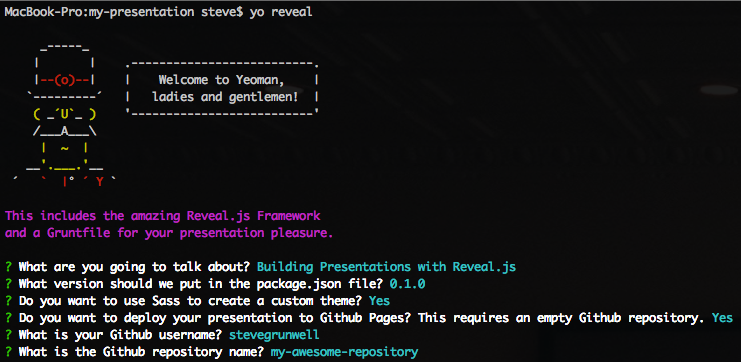As I mentioned in my Exporting Reveal.js Slides to PDF Using Decktape post last week, I tend to use Reveal.js – a HTML- and JavaScript-powered presentation framework – for most of my conference talks. Having given a fair number of presentations using the framework over the last few years, I thought it might be useful for speakers who haven’t yet tried (or found their footing with) Reveal.js if I laid out my preparation workflow.
Page 7 of 15

While I was in St. Louis for php[tek], php[architect] announced the release of their latest book, Building Exceptional Sites with WordPress and Thesis by Peter MacIntyre. php[architect]’s Editor-in-Chief, Oscar Merida, asked if I’d be willing to read through the new book and offer my thoughts, and I quickly accepted; not only have I been looking forward to meeting Peter in-person (he’s one of the organizers of Northeast PHP, where I’ll be speaking in early August), but the book’s forward was written by my close friend and mentor, Eric Mann.

After giving two talks last weekend and WordCamp NEO, one of the conference organizer emailed me and asked if I could provide PDF versions of my slide decks to send to WordPress.tv.
If you’ve seen one of my talks before, you may know that I’m a huge fan of Reveal.js, a JavaScript presentation framework that allows me to author my slides using Markdown, present in a browser, and share everything via GitHub Pages. Then, as I give talks at multiple conferences, people can see what’s changed, report any inaccuracies, and see my presentation history. Pretty snazzy!

As you may be aware, I have a profile on PHP Mentoring and am currently working with a number of PHP developers looking to grow their skills and kick-start their careers. Last week, I received an interesting question through the site, and half-way into writing my response I realized it would make a useful blog post: when writing a WordPress plugin, should I be using procedural or object-oriented programming?

Today marks one year since I sat down, decided I was unhappy with my body, and started taking steps to actively lose weight. Years of “oh, I’ll offset X with a salad tomorrow” had proven that approach ineffective, and with my daughter on the way, I decided it was time to stop being passive about my efforts.
I started tracking my meals and activity on MyFitnessPal; after a month or so (and weighing in at 12lbs less than when I started), I wrote a blog post, On Weight Loss, about what I had learned in the first month. It was an extremely personal post for me, but it also helped to keep me accountable throughout the rest of the year. I also received a lot of great words of encouragement, both on the post and through other channels, from both friends and total strangers alike.

Late last year, Google and other organizations rolled out the open-source Accelerated Mobile Pages (AMP) Project, with the goal of introducing lightweight, lightning-fast content for users on mobile devices. AMP is essentially a subset of HTML and scripts – optimized for caching and performance – designed to speed up the mobile web and to make content accessible to every user, regardless of connection speed or strength.
A few months ago, 10up President Jake Goldman published What Google’s Accelerated Mobile Pages (AMP) means for Consumers, Publishers, and the Future, a piece that has helped spark a lot of interest in Accelerated Mobile Pages among 10up’s clientele, a group lined with major publishers and news outlets. In the article, Goldman concludes that publishers “in a crowded or hotly contested news space, or seeing meaningful traffic to stories from Google, need to quickly prioritize AMP HTML.”

It’s been a few months since I’ve written about my weight loss efforts, but I’m proud to report that the progress continues. As of this morning, I’ve lost 46 pounds since June 2015, and I may yet reach my goal of losing a total of 60 by the first of June this year.

This past weekend, my wife, her mother, and I took my daughter, Emily, to the far-off land of Indiana to meet some of her maternal relatives who have yet to be graced by her presence. Some are elderly and have difficulty with travel, while others have large families of their own making lodging a logistical nightmare. Regardless, this post isn’t about why we were traveling, just that we had a 4.5 hour drive with an infant just north of 7 months old.
Shit happens, and – in this case – literally.

Another week, another new plugin, it seems. This time, I’m proud to announce that McAvoy is now available in the WordPress.org repository!
McAvoy was born out of a client need to get information about what visitors are searching for on their site. While there are enterprise-level packages to do this and it’s pretty easy to set up in something like Google Analytics, our client wanted a solution that would simply collect information about what people were searching for and make it visible within the WordPress Admin dashboard.
I recently released Advanced Post Excerpt, a free plugin that replaces the standard WordPress “Post Excerpt” meta box (a plain textarea) with a stripped down TinyMCE editor instance. Finally, there’s no need for your authors to write HTML (or copy it out of the “Text” tab of the main editor); instead, they’re given the essentials for WYSIWYG text editing (bold, italic, link, etc.) and nothing more.




